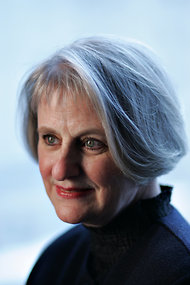 Fred R. Conrad/The New York TimesJudge Denise Cote, whose opinion expressed support for the government’s position.
Fred R. Conrad/The New York TimesJudge Denise Cote, whose opinion expressed support for the government’s position.
8:35 p.m. | Updated In a decision that could start an e-book price war in the publishing industry, a federal judge on Thursday approved a settlement between the Justice Department and three major publishers in a civil antitrust case that accused the companies of collusion in the pricing of digital books.
The long-expected approval soundly rejected criticisms of the deal that had accumulated throughout the summer from hundreds of parties, including Barnes Noble, the Authors Guild and the American Booksellers Association.
And the ruling promised to empower Amazon, the e-retailing giant, to drop the price of many e-books back to $9.99 or even lower in the coming months, a move that could pressure competing retailers to do the same.
Publishers and authors direly predicted that in the long run, the settlement could allow the e-book marketplace to return to its state several years ago, when Amazon had close to 90 percent of the market and other retailers struggled to get a foothold.
“I think that everybody competing with Amazon in the e-book market had better fasten their seat belts,” Mike Shatzkin, the founder and chief executive of the Idea Logical Company, a consultant to publishers, said in an interview. “I would expect Amazon to be leading the charge to cut prices on the most high-profile e-books as soon as the decision allows them to do so. As soon as that starts to happen, all the books that are competing with them will have to reconsider their prices.”
The Justice Department cited a lack of price competition when it filed the suit in April against five major publishers and Apple, accusing them of conspiring to raise the cost of e-books and causing consumers to pay tens of millions more than they otherwise would have.
Gina Talamona, a spokeswoman for the Justice Department, praised the ruling on Thursday, saying that “consumers will start to benefit from the restored competition in this important industry.”
Denise L. Cote, the federal district judge in Manhattan overseeing the case, expressed support for the government’s position in her opinion, particularly in regard to a “cooling off” period during which the publishers cannot restrict the ability of retailers to set their own prices for e-books. This period, she wrote, would allow the industry “to return to a competitive state free from the impact of defendants’ collusive behavior.”
The government’s case stemmed from a policy that the publishers adopted in 2010 that effectively coordinated the price of many newly released e-books to $12.99 to $14.99, a change encouraged by Steven P. Jobs, then Apple’s chief executive. After striking a deal with Apple, the publishers then renegotiated contracts with Amazon and other retailers, allowing the publishers, and not the retailers, to set prices on e-books.
Three publishers — the Hachette Book Group, Simon Schuster and HarperCollins — denied wrongdoing but agreed in April to settle with the government, while the Penguin Group USA, Macmillan and Apple declined to settle. They face a trial next summer.
In her 45-page opinion issued Thursday, Judge Cote said the Justice Department had claimed a “straightforward, horizontal price-fixing conspiracy.” She rejected arguments against the settlement, saying they were “insufficient” to deny its approval, and dismissed requests to hold an evidentiary hearing as an unnecessary delay.
The settlement calls for the three publishers to end their contracts with Apple within one week. The publishers must also terminate contracts with e-book retailers that contain restrictions on the retailer’s ability to set the price of an e-book or contain a so-called “most-favored nation” clause, which says that no other retailer is allowed to sell e-books for a lower price.
For the next two years, the settling publishers may not agree to contracts with e-book retailers that restrict the retailer’s “discretion over e-book pricing,” the court said. For five years, the publishers are not allowed to make contracts with retailers that include a most-favored nation clause. “The time limits on these provisions suggest that they will not unduly dictate the ultimate contours of competition within the e-books industry as it develops over time,” Judge Cote wrote.
Penguin and Macmillan are not subject to the settlement and can continue to set the prices for their e-books while the legal case against them proceeds. The sixth major publishing company, Random House, was not named in the Justice Department’s lawsuit.
Amazon declined to comment on Thursday. But when the settlement was announced in April, Amazon called it “a big win for Kindle owners,” and said it looked forward to eventually lowering its prices on e-books.
Simon Schuster, the Hachette Book Group, HarperCollins and Barnes Noble declined to comment.
Paul Aiken, the executive director of the Authors Guild, which vigorously opposed the settlement, said in an interview that the biggest losers would be traditional independent bookstores. If the cost of a newly released e-book drops further, the bookstores will have more trouble selling hardcover books at their current prices, he said.
Article source: http://mediadecoder.blogs.nytimes.com/2012/09/06/judge-approves-e-book-pricing-settlement-between-government-and-publishers/?partner=rss&emc=rss
Speak Your Mind
You must be logged in to post a comment.